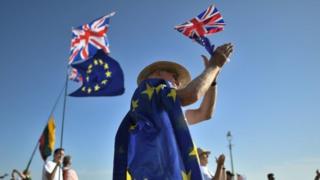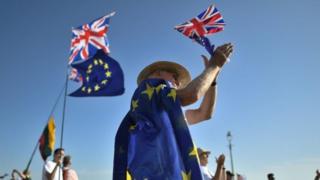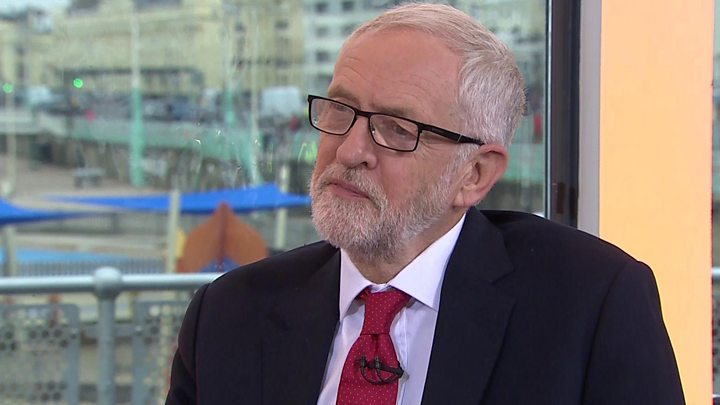Jeremy Corbyn faces battle with Labour members over Brexit policy
Members at the party’s annual conference will choose between backing Remain or staying neutral. …

 Image copyright PA Media
Image copyright PA Media Jeremy Corbyn faces a battle over Labour’s Brexit policy later as members choose between two competing strategies at the party’s annual conference.
Delegates are to decide whether the party should explicitly back Remain in a future public vote, or adopt the leadership’s neutral position.
Labour’s stance on Brexit has dominated the conference agenda, with many in the party disagreeing over the issue.
It is expected that two motions on the issue will be put to a vote on Monday.
The party’s draft plan for its Brexit policy, put forward by Mr Corbyn, suggests that, if Labour wins power in a general election, it would remain neutral while negotiating a new Brexit deal within three months.
It would then hold a referendum within six months, and the party would decide which side to back at a special conference.
But grassroots activists at the conference have campaigned for an unambiguous Remain stance.
It comes amid calls for the party to back remaining in the European Union, including by a number of Labour MPs such as shadow foreign secretary Emily Thornberry.
Late on Sunday, attempts to find a consensus during a behind-closed-doors “compositing” meeting failed to agree on words for a single Brexit motion.
As a result, members will debate two separate motions on Monday. One would commit the party to campaigning “energetically” to remain in the EU during an expected snap election.
The other – closer to Mr Corbyn’s position – would see the party remaining officially neutral and only taking sides ahead of a subsequent referendum.
A statement by Labour’s ruling National Executive Committee (NEC) said the party should only decide how to campaign in a referendum at a special conference held after a general election.
The BBC’s political correspondent Iain Watson said the Remain position “will almost certainly need some trade union support to pass”. Unions control half of the votes at the Labour conference.
‘A step forward’
Andrew Lewin, of Remain Labour, said the prospect of alternatives being put to a vote was “a huge step forward”.
“Labour members will tomorrow have the chance to change party policy – so Labour commits to campaign to Remain in all circumstances,” he said.
Michael Chessum, of left-leaning group Another Europe, told the BBC that Monday’s vote was not just about Brexit.
“It’s about where Mr Corbyn and the unions are really willing to listen to party members,” he said.

Media playback is unsupported on your device
Speaking to the BBC’s Andrew Marr show on Sunday, Mr Corbyn would not be drawn on which side he would back, saying “let’s see” what kind of new deal he was able to negotiate with the EU.
He said the party must respect the result of the Brexit referendum and do more to understand why people voted to leave.
Shadow Brexit secretary Sir Keir Starmer and Ms Thornberry – who both support Remain – are due to speak at the conference on Monday afternoon.
Labour will also announce a pledge to introduce free personal care in England for over-65s most in need of it, so they will not have to pay for help with dressing, washing and meals.
At the moment, those with savings of more than £14,250 have to contribute to the cost of home or residential help.
It is the latest of several new policies announced at the conference, including pledges to:
- Get rid of Universal Credit
- Scrap Ofsted, which it called “unfit for purpose”, and replace it with a new schools inspections system
- Make NHS prescriptions free in England, bringing it in line with Scotland, Wales and Northern Ireland
- Force large employers to provide flexible working hours to women experiencing symptoms of the menopause
On Sunday, party members also voted in favour of integrating private schools into the state sector.
Independent schools would have their charitable status withdrawn, as well as other public subsidies and tax privileges, and universities would have to admit the same proportion of private school students as in the wider population, currently 7%.
The vote means members have signalled a desire for the policy to be included in Labour’s next general election manifesto.
The start of the conference, on Saturday, was overshadowed by a failed attempt to oust deputy leader Tom Watson.
Mr Watson later said he was disappointed by the move but called for unity.
And on Sunday, one of Mr Corbyn’s senior aides, Andrew Fisher, announced his intention to resign as head of policy.
Mr Corbyn confirmed that Mr Fisher was leaving, saying it was a “very stressful and full-on job”.




